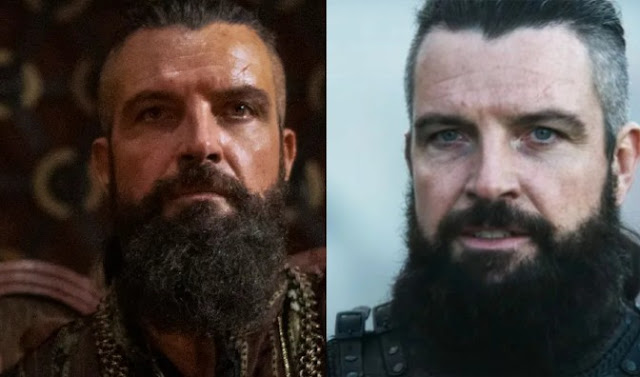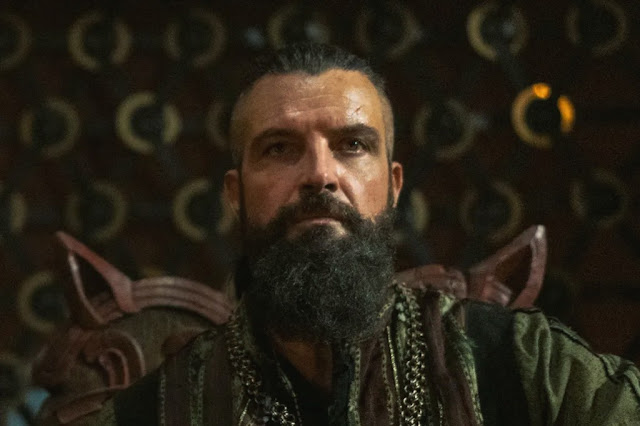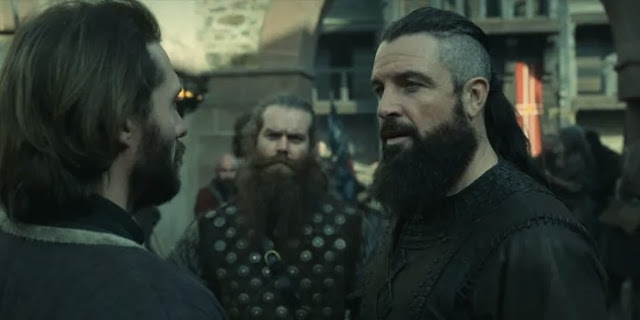King Canute's true story and what happens to him in the Vikings: Valhalla
King Canute is one of the main Vikings heroes: Valhalla. But the true story of the historical character is more fascinating than the show.
So far, Canute's exploits on the show have certainly been plentiful, and his ambitions are greater than what he currently has. Having successfully seized the English throne, Canute looks forward to the next part of his plan to fulfill his dream of establishing an empire in Northern Europe, something he speaks of more candidly after the conquest of London. While it is fair to say that the historical events upon which the show is based were somewhat brief and romantic, it is also fair to acknowledge the true tales upon which the show is based.
Behind the show's main narrative is a true story that forms a heartbreaking end to many Vikings: Valhalla's characters and plots. Those who are aware of Canute's realistic historical significance will already know that he is destined for a certain level of greatness within the show, which is confirmed by Canute's vocal ambitions. What this true story is, however, and what level of greatness Canute will achieve beyond what the show has already said, remains to be seen. Here's how the demo version of the events compares to the real Canute version.
How does Canute differ in Vikings: Valhalla?
The character of Canute in the Vikings: Valhalla appears as a fierce and cunning person, someone who is open to both pagan and Christian religions, some of which do not seem too far-fetched from historical truth. The most notable aspect of Canute's historical character is his piety and devotion to the Church, particularly the English Church, although his motives are perhaps more obscure. Vikings: Valhalla's story of Christianity versus Norse paganism seems entirely true in history. While the real Canute was indeed a Christian and devoted to his religion, it should be noted that the Norse/Viking's way of life prevailed much more in Scandinavia than in the English.
While this culture clash is certainly represented in the show's plotline, it appears in a different light. The show appears to pit two factions of Vikings against each other, those who converted to Christianity and those who follow the ancient gods, leaving leaders like Canute in the middle, trying to balance the two. While this is by no means far-fetched, it largely ignores the rough spot in Canute's real-world ecclesiastical relationship, which was repaired by buying the church with donations and reparations. The true story of Vikings: Valhalla's characters are ultimately more complex than what viewers think of the show. While Canute's religious beliefs and even some of his personality traits portrayed in the show are true, it's possible that he was more ruthless in real life, and that his historical accomplishments were the result of purchasing power rather than goodwill.
How and when did he become King of England?
Despite the somewhat faithful representation of Canute's historical character on the show, the timeline of events is somewhat less clear, and even less historically accurate. The St. Brice's Day Massacre, which put the show's plot into action, occurred 14 or so years before Canute's ascension to the English throne, and the retaliatory invasion of the Scandinavians was led by Canute's father, Swain Forkbeard. Vikings: Valhalla failed to avoid timeline errors, and although Canute may have been present at his father's conquest, it had little effect on him.
Instead, the invasion of Canute would take place years later, and the battles that took place were not as fast as the show had shown. The battles ranged across England, from Dorset and Wessex, the occupation of Northumbria, and the battles in Essex. The betrayal of individuals like Edric Strona depicted in the show is historically valid, albeit not so much in time and place. The final defeat of King Edmund saw Canute take control of the lands north of the Thames, and he was promised to the rest of England upon Edmund's death, an event that would take place weeks later under circumstances lost in history. However, while the exact timeline and historical accuracy of Vikings: Valhalla are manipulated, many story beats remain true.
When Canute becomes King of Denmark?
The most puzzling change that Vikings: Valhalla has made regarding Canute's timeline is that it begins with him as King of Denmark. In real life, Canute acceded to the throne of England before he did Denmark, with his brother Harald (not the same Harald as in the show) sitting on the Danish throne. It's possible that the show condensed these siblings into one character for ease of narration of the show, and so many Haralds don't get mixed up in the plot (considering Harald Sigurdsson's participation in Valhalla). However, it should be noted that Canute was not a king before his victory over the English.
Compared to the show, history tells of Canute's ascension to the Danish throne as a result of his brother's death, as Canute traveled to Denmark to take the throne. Although relatively insignificant to the show's narrative, it still seems odd to consider Canute traveling as far from England in a similar time frame as the show anyway. Regardless, in just two years, Canute cemented himself as king of both Denmark and England. But his aspirations did not stop there.
Is Canute's dream of the Northern Empire a reality? did he succeed?
In addition to his desire for the English throne, Canute talks about creating a northern empire on the show, matching the aspirations of his historical counterpart. Ragnar's unparalleled legacy to the Vikings remains important to the Vikings' characters: Valhalla, the inspiration of greatness in all those who desired glory, and the desire for glory that also harbored historical Canute. In real life, Canute's dreams of a Northern Empire surely came true, bringing to life the North Sea Empire, unifying the thrones of England, Denmark, Norway, and even the regions of Sweden and the Baltic coast.
While the building of this empire was a cumulative process, with Norway being incorporated into the empire 10 years after Denmark and just seven years before Canute's final death, it was worth watching. Vikings Map: Valhalla and its geographical locations remain somewhat limited in the meantime; however, if the show seeks to follow Canute's real-world achievements, the show's geographic reach must also be expanded. The power and scope of Canute's Empire rivaled that of some of the most powerful empires of the era, such as the Holy Roman Empire (albeit for a brief period), and as a result, Canute will be remembered in history as the most effective ruler of Anglo-Saxon England.
Why does Canute disappear from the story of Valhalla and what happens next?
In the final half of Vikings: Season One of Valhalla, Canute is summoned away from England to deal with a people referred to as the Wendys. While this historically referred to a large group of people, the display likely referred to Canute's quarrels with the people of the Baltic region. Although significantly different from the Vikings in many ways, the Wends referred to in Valhalla likely occupied the same geographical area that Ragnar had tired of raiding for meager rewards, leading him to sail to England in the first place. Despite a soft and possibly unintended nod to the original show's beginnings, it also remains somewhat true to Canute's real-life history, as he not only ruled lands in the region but also waged war in the region after his ascension to the English throne. Perhaps the most important part of Canute's absence is Godwin staying in England. Historically, he accompanied Canute on his journey to fight the Wendys and his actions earned him the king's unique trust.
However, the potential for their relationship to grow elsewhere remains, as Godwin's importance in the plot is part of the Vikings: Valhalla's preparation to give Rollo a final victory over Ragnar. Historically, Godwin's son Harold ascended the English throne in 1066. He lost it soon after in a series of battles that saw William of Normandy, a descendant of Rollo, assuming the English throne. No doubt Godwin's rise to prominence will be explored through the show as it thrusts into this turbulent period of history, with Godwin gaining influence at Canute's court.
Therefore, Canute's invasion of England set in motion a chain of events that could no longer be stopped. While the condensation and rewriting of history are evident in Vikings: Valhalla, it is also clear that he intends to honor the narrative strokes of real history, having already begun to stir up the conflicts that might occur in later seasons. Before the Vikings: Valhalla delves into the future in-depth, however, there is still much to Canute's story to be told, with plenty of exciting things from his real history waiting to be depicted.







No comment